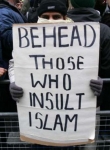16 January 2012
Islamic States Pledge Tolerance as Report Says They Practice Persecution
 Concerns about an Islamic-sponsored “combating intolerance” initiative at the United Nations are brought into sharp relief by results of a new world survey on religious persecution
Concerns about an Islamic-sponsored “combating intolerance” initiative at the United Nations are brought into sharp relief by results of a new world survey on religious persecution
Muslim nations make up nine out of the top ten countries where Christians face the “most severe” persecution, and 38 of the top 50, reports U.S.-based Open Doors in its 2012 World Watch List.
Topping the list is North Korea, where the Stalinist regime enforces cult worship of its leaders.
The results lay bare the sheer incongruity of the idea that the Organization of Islamic Cooperation (OIC), whose 56 member states control more than a quarter of the votes in the UN General Assembly, can be serious about promoting religious tolerance.
Yet that is what it claimed by successfully pushing for an assembly resolution titled “Combating intolerance, negative stereotyping, stigmatization, discrimination, incitement to violence and violence against persons, based on religion or belief.” The measure, which passed last month, mirrored an almost identical resolution in the UN Human Rights Council (HRC) in Geneva last March.
The assembly resolution, which the United Arab Emirates tabled on behalf of the OIC, repeats the prior HRC measure’s call for governments to “take effective measures to ensure that public functionaries, in the conduct of their public duties, do not discriminate against an individual on the basis of religion or belief.”
OIC member states want us to believe they are promoting that and the many other praiseworthy precepts of both resolutions even though a majority of them oppose the measures through their actions.
What’s more, a decade’s worth of Open Doors surveys shows that “the persecution of Christians in these Muslim countries continues to increase,” the group’s Dr. Carl Moeller reports.
And so the question begs: If most OIC member states practice the opposite of each resolution’s stated intent, why did the organization launch the initiative?
The answer lies in the language of early drafts of the resolution the OIC shepherded through the Human Rights Council. Those drafts focused heavily on the idea that states should show tolerance for Muslim peoples around the world.
Western negotiators explained to their OIC counterparts that they needed to “universalize” the language if the text was to stand any chance of winning Western support.
The OIC complied in order to see the Human Rights Council resolution succeed. Likewise, the current General Assembly resolution – approved by consensus in a key assembly committee Nov. 15, and by the full assembly Dec. 19 – conforms with universal rights doctrine when taken at face value.
But unspoken UN convention will ensure that the imprint of the earlier Muslim-specific language will remain in spirit. This will have the effect of giving Islamic countries added force when they speak out against incidents they believe to have slighted the Islamic faith.
Obvious past examples of perceived slights include the cartoon depictions of the Prophet Muhammad by a Danish newspaper in 2005.
For more than a decade, the OIC sought protection for Islam by annually pushing through resolutions that explicitly granted faiths the right not to be “defamed.” It abandoned that cause last March when Western-led opposition had grown big enough to defeat it. The West argued that human rights protections extended only to individuals, not to beliefs.
In exchange for dropping the “defamation” language, the OIC was rewarded with massive Western buy-in of their resolution. These included most famously the high-level events endorsing the resolution by Secretary of State Hillary Clinton, first in Turkey and then in Washington, in joint appearances with the OIC leadership.
But while the OIC’s adoption of universal language for its “combating intolerance” initiative won it Western support, no one is expecting change on the ground in the bulk of Islamic countries any time soon.
Afghanistan, Saudi Arabia, Somalia, Iran, Maldives, Uzbekistan, Yemen, Iraq and Pakistan complete the Open Doors Watch List’s top ten persecutors of religious minorities – in that order after North Korea.
Discrimination against religious minorities in these and many other Islamic countries on the Watch List is so deeply entrenched that it’s inconceivable they have the slightest intention of conforming to the precepts in the OIC draft they themselves have authored.
As such, the problem is not with the document per se, but with its sponsor. Simply put, the OIC initiative was not an honest one. That in itself should have raised alarm bells – even as the language used appears to be generally in line with universal standards.
14:50 Posted in Middle East, Real Islam | Permalink | Comments (0) | ![]() Facebook |
Facebook |



















The comments are closed.